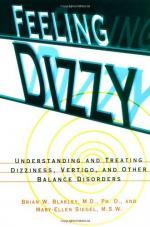|
This section contains 974 words (approx. 4 pages at 300 words per page) |

|
Dizziness is classified in three categories—vertigo, syncope, and nonsyncope nonvertigo--each with symptoms related to the sense of balance. In general, syncope is defined by a brief loss of consciousness (fainting) or by dimmed vision and feeling uncoordinated, confused, and lightheaded. Many people experience a sensation like syncope when they stand up too fast. Vertigo is the feeling that either the individual or the surroundings are spinning. Individuals with nonsyncope nonvertigo dizziness feel as though they cannot keep their balance.
The brain coordinates information from the eyes, inner ear, and the body's senses to maintain balance. If any of these information sources is disrupted, the brain may not be able to compensate. For example, people sometimes experience motion sickness because the information from their body tells the brain that they are sitting still, but information from the eyes indicates they are moving. The messages don't correspond and...
|
This section contains 974 words (approx. 4 pages at 300 words per page) |

|


